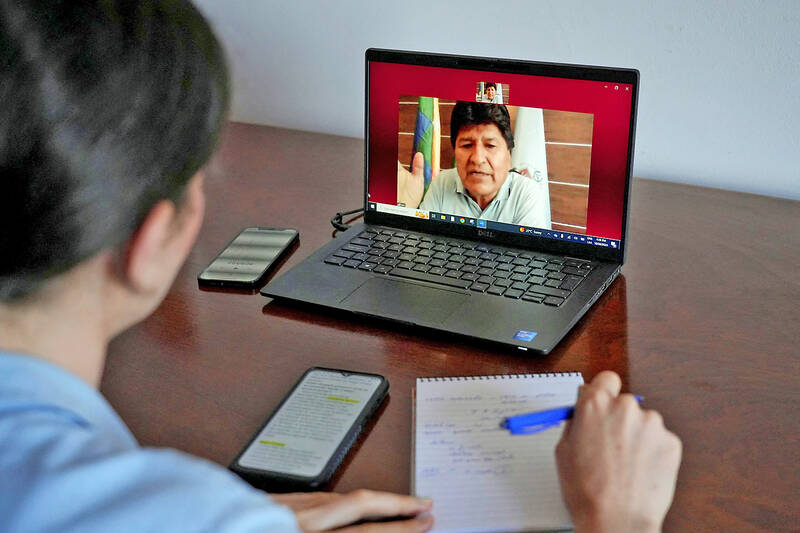The Bolivian government on Monday denied accusations that it had led a targeted attack on former Bolivian president Evo Morales, whose car was shot at on Sunday, claiming the former leader’s convoy had fired on special anti-narcotics police who were carrying out a patrol.
Morales claims the government had attempted to assassinate him when bullets struck his car, marking a new chapter of tensions in the Andean nation between Morales and former ally Bolivian President Luis Arce.
Bolivian Minister of the Interior Eduardo del Castillo during a news conference said that the FELCN counternarcotics police was carrying out a standard highway patrol when Morales’ convoy shot at police and ran over an officer.

Photo: Reuters
Morales in a radio interview on Sunday said that he had indeed shot back at police after they opened fire.
Morales’ vehicles were suspected of transporting drugs, the Bolivian government said.
The former president called the allegations that authorities were carrying out an anti-drug trafficking operation false.
“If that were the case, why did your elite military and police team shoot more than 18 times at the vehicles I was traveling in?” he wrote on X.
Del Castillo added that Morales had instructed his vehicles to be burned after the run-in, destroying any evidence before it could be collected.
“If he had really been victim of an assassination attempt, it would have been in his interest to leave them intact” so that investigators could search them to collect evidence, del Castillo said.
The rising tensions between the current and former presidents and their followers threaten to ignite a political crisis in Bolivia in the run-up to an election next year.
Morales, who served three terms as president, resigned in 2019 after a disputed election that plunged the country into turmoil. Arce, his former economy minister, was elected the following year.

Seven people sustained mostly minor injuries in an airplane fire in South Korea, authorities said yesterday, with local media suggesting the blaze might have been caused by a portable battery stored in the overhead bin. The Air Busan plane, an Airbus A321, was set to fly to Hong Kong from Gimhae International Airport in southeastern Busan, but caught fire in the rear section on Tuesday night, the South Korean Ministry of Land, Infrastructure and Transport said. A total of 169 passengers and seven flight attendants and staff were evacuated down inflatable slides, it said. Authorities initially reported three injuries, but revised the number

A colossal explosion in the sky, unleashing energy hundreds of times greater than the Hiroshima bomb. A blinding flash nearly as bright as the sun. Shockwaves powerful enough to flatten everything for miles. It might sound apocalyptic, but a newly detected asteroid nearly the size of a football field now has a greater than 1 percent chance of colliding with Earth in about eight years. Such an impact has the potential for city-level devastation, depending on where it strikes. Scientists are not panicking yet, but they are watching closely. “At this point, it’s: ‘Let’s pay a lot of attention, let’s

UNDAUNTED: Panama would not renew an agreement to participate in Beijing’s Belt and Road project, its president said, proposing technical-level talks with the US US Secretary of State Marco Rubio on Sunday threatened action against Panama without immediate changes to reduce Chinese influence on the canal, but the country’s leader insisted he was not afraid of a US invasion and offered talks. On his first trip overseas as the top US diplomat, Rubio took a guided tour of the canal, accompanied by its Panamanian administrator as a South Korean-affiliated oil tanker and Marshall Islands-flagged cargo ship passed through the vital link between the Atlantic and Pacific oceans. However, Rubio was said to have had a firmer message in private, telling Panama that US President Donald Trump

CHEER ON: Students were greeted by citizens who honked their car horns or offered them food and drinks, while taxi drivers said they would give marchers a lift home Hundreds of students protesting graft they blame for 15 deaths in a building collapse on Friday marched through Serbia to the northern city of Novi Sad, where they plan to block three Danube River bridges this weekend. They received a hero’s welcome from fellow students and thousands of local residents in Novi Said after arriving on foot in their two-day, 80km journey from Belgrade. A small red carpet was placed on one of the bridges across the Danube that the students crossed as they entered the city. The bridge blockade planned for yesterday is to mark three months since a huge concrete construction